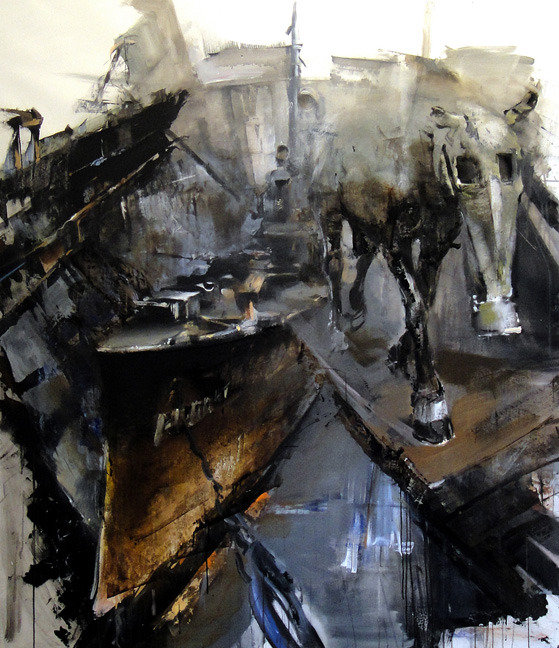Zsolt Bodoni
dal 13/5/2011 al 17/6/2011
Segnalato da
13/5/2011
Zsolt Bodoni
Mihai Nicodim Gallery, Los Angeles
Gods and Mortals. Bodoni's new works make no apologies for the reinvestigation of age old subject matter: most notably the female nude and the equestrian statue. With their roots in antiquity and re-births throughout art history, it might be imagined that these symbols of love, beauty and power might have completed their cycles of reincarnation.

Mihai Nicodim Gallery is delighted to present "Gods and Mortals", Zsolt
Bodoni's second solo show at the gallery. The artist's first solo
exhibition earned him critical acclaim, with writers noting his adept hand
and darkly dramatic imagery tempered by cool decision making and
considerable painterly ability: “Bodoni firmly resists the seduction of
poetic embellishment, conceptual or painterly, a restraint that pays off
in a dynamic tension between seemingly tentative passages of blurry
abstraction and human forms and cityscapes described with shimmering
clarity”. Lara Taubman, Art in America (10/22/09). This second solo show
not only builds upon the artist's reputation but reveals a body of
painting that confirms Bodoni's place amongst the strongest of a new
generation of young figurative painters.
It has become apparent over the past few years that a number of young
artists - principally, but not exclusively from Central and Eastern Europe
- have emerged onto the world scene to great acclaim; putting to shame
those critics who from the 1960's through to the 1990's, sought to keep
figurative painting far from the epicentre of the art world. Painting was
deemed to be 'passé' by many, 'over' by others and, on many occasions,
proclaimed as well and truly 'dead'. Those who still believed it was
possible to be a painter and a successful visual art often felt obliged to
work in clever conceptual twists to their paintings in order to validate
their work. The generation of artists (predominantly those in their early
30's through to their early 40's) who are garnering attention now
recognise the importance of bringing something new to this age old medium,
but reject the corny devices or world weary irony that characterised so
much of the painting of the late 20th and early 21st Century. Instead they
prefer to use their chosen medium to create a dialogue with the viewer,
allowing the power of paint in all its plastic, tactile and inviting
nature, to draw together diverse forms and subject matter collated from
old master paintings, sculptures, books, magazines, and that most
contemporary of mediums, the internet.
Zsolt Bodoni's new works make no apologies for the reinvestigation of age
old subject matter: most notably the female nude and the equestrian
statue. With their roots in antiquity and re-births throughout art
history, it might be imagined that these symbols of love, beauty and power
might have completed their cycles of reincarnation. Not so. Bodoni turns
again to the foundries that have inspired so much of his recent bodies of
work. Venus is reborn again but Mars, so often her companion in
Renaissance painting, is present here too amidst the engines of war:
powerful machines, workers and half finished assemblages. Great, half
finished equestrian statues are inspected for approval and, lest we forget
the cost to animals as well as humans in wartime, Bodoni reminds us by
depicting a horse in a gas mask, plodding obediently and precariously
along a makeshift track as a great war ship prepares to embark far below.
Of late, Bodoni has been increasingly interested in the motivations that
lead to war. Casus Belli as the Romans knew it has been prompted by acts
of aggression but often by the destruction, or rumoured destruction of
something poignant or symbolic to a particular people. The bones of saints
have been fought and died over. Strange masks and caskets were created at
huge expense to protect and preserve what amounted to ghastly visions of
mummified features yet these were often revered and worshipped, and in
some cases still are, the objects believed to be invested with
supernatural powers. In his recent paintings, Bodoni has also begun to
consider the role of signifiers in relation to human responses. Sometimes
it's sufficient for an item of clothing to evoke an emotive reaction. It
might be a pair of boots, or a glove or a uniform; such as the uniform
worn by an infamous general which when discovered by a party of soldiers
looking to arrest the owner, was shot to pieces out of their frustration
at his 'getting away'.
Bodoni understands that humans need symbols. He's not judgemental in his
depictions, and he isn't pointing the finger at the modern world as so
many are wont to do. The statuary of the ancient world isn't so very far
removed from the mortal gods of today's celebrity culture. In Bodoni's
paintings these heroes and heroines are recycled; caught either in the
moment of rebirth or re-casting. Each time may produce its own icons but,
Bodoni appears to be saying, nothing will last forever. Even as the artist
exposes this cycle of construction and destruction he reminds us that the
pursuit of beauty and the act of investing an object with particular
meaning, can result in terrible destruction. Bodoni doesn't labour the
point, he just traces the course. If we make gods out of mortals, Bodoni
seems to be saying: trouble will follow. Lest we need convincing further,
a female nude holds up the grinning skull of a ram. The painting is an
allegory of beauty and death; the one irretrievably linked with the other.
Opening Reception: Saturday, May 14, 2011, 6 - 9 PM
Mihai Nicodim Gallery
3143 S. La Cienega Blvd - Los Angeles
Gallery Hours: Tuesday – Saturday 11-6 pm



